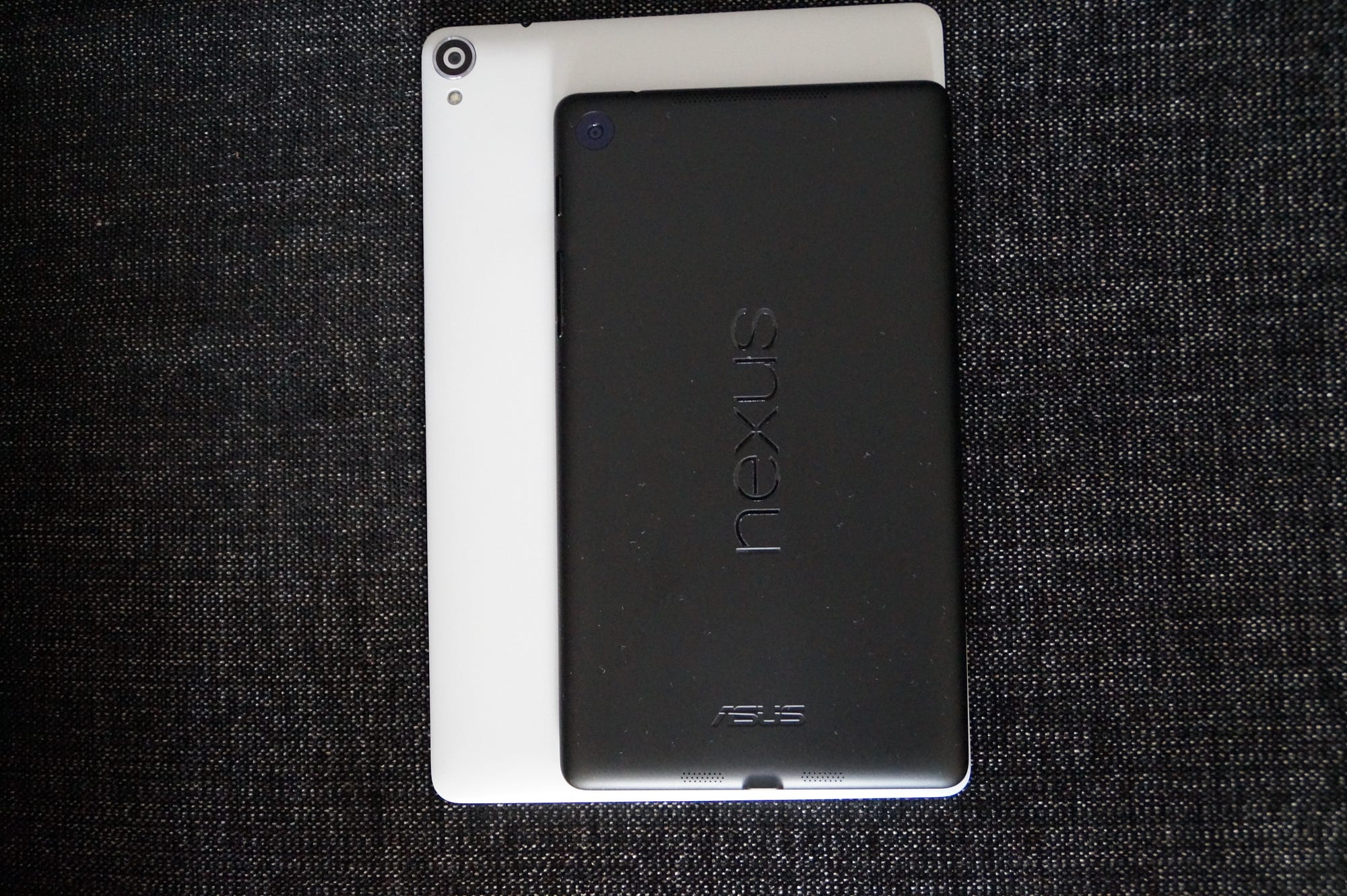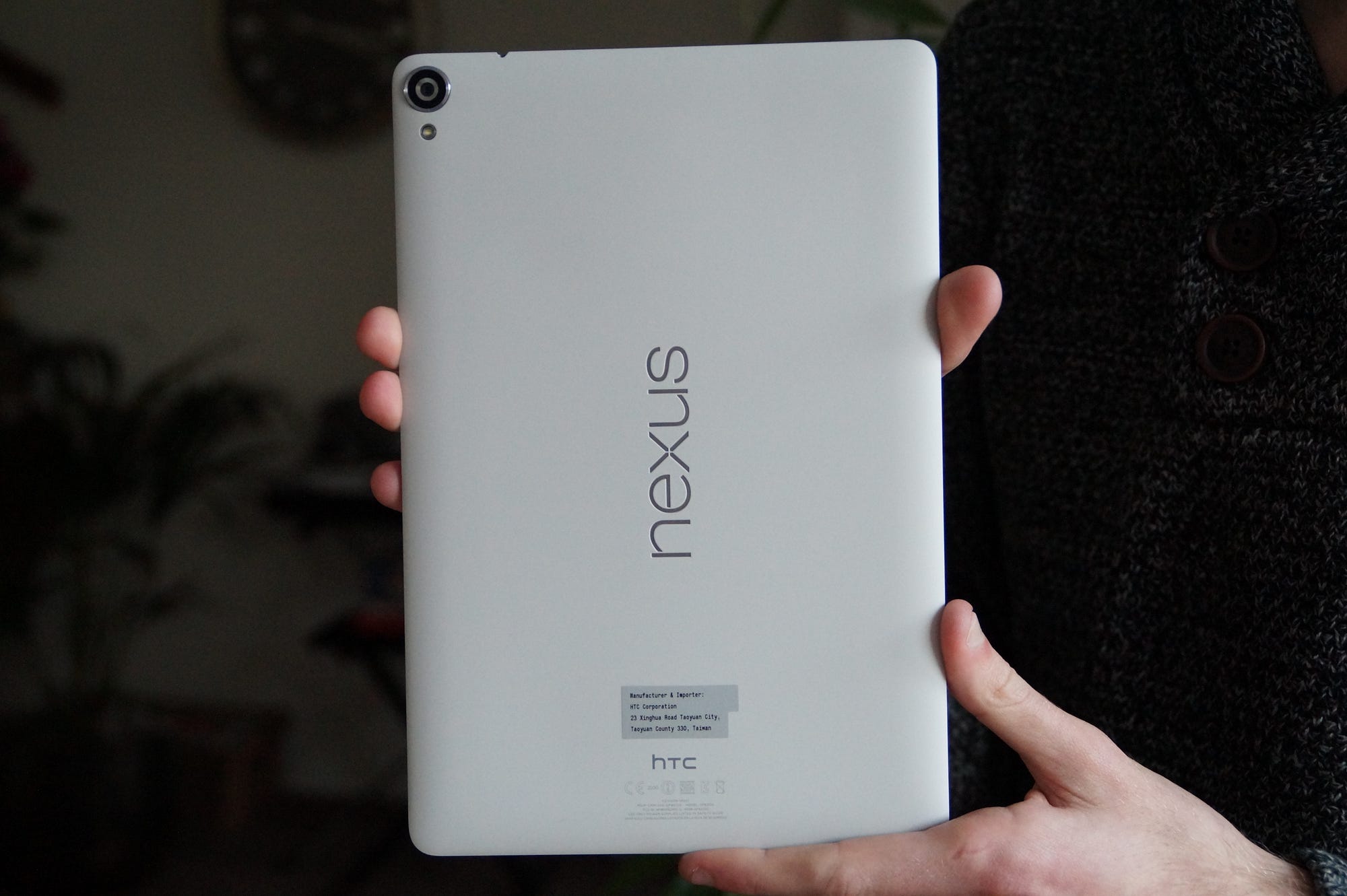I
won’t compare the Nexus 9 to the iPad, simply because I can’t: I have
never owned or even used an iPad. I have been using a Nexus 7 however
and I love it for its portability. It’s easy to hold in one hand and I
really like to use it for reading a book or articles I saved to Pocket. I
was wondering if the 2 inch larger display of the Nexus 9 would make a
difference, but what I found the most important is that the Nexus 9 has
an aspect ratio of 4:3
Display
Yes,
the 16:10 aspect ratio on the N7 is great for watching video, but I
didn’t really like web browsing. I’m still missing my old 4:3 display,
although my laptop display has a much higher resolution. On a 16:10
display websites are a little narrow in portrait mode, and you have to
scroll a lot when in landscape mode. A lot of websites are optimized for
4:3 displays, because it’s a popular aspect ratio on the iPad. Sites
that have a responsive design were often shown in an awkward blown-up
phone version on the N7. On the N9 you can just see more and read small
text without zooming in.
The
N7 is known for its great display with a resolution of 1200x1920 with a
pixel density of 323 pixels per inch. The N9 also has a beautiful
display. It’s an LCD display with a resolution of 1536x2048. This
results in a pixel density of 281, but that’s definitely enough. A lot
of reviews report the display has backlight bleed. My unit has little in
the top right corner, but I didn’t notice this with normal use. I
mostly use my tablet in the comfort of my own home, so I haven’t really
used it outside. The display can be really bright, but I mainly used it
with the slider just a little up.
What
I really like about the Nexus devices is the minimalistic design. Some
may find it boring, but I think it really emphasizes the most important
thing: the content on the screen. What you will find on the front are
dual BoomSound speakers. This is one of the features HTC brought to the
device.(an other one being double tap to wake the screen which I
absolutely love). I don’t think they are as good as the ones on the HTC
One (M7), but in general speakers on the front make so much more sense
to me. You find the 1.6 MP camera above the speaker.

Build quality
The
Nexus 5 came in two colors. Black and white. I have the white Nexus 5
because I liked the black front and white back. I knew the white back
panel was made of a different material than the black one, but I really
liked it. That’s also the reason why I picked up a Lunar White Nexus 9.
If you have read other reviews, you know that a lot of people have
issues whit their back panel. There is a gap on some devices. The review
units Google sent out have black back panels. My white unit doesn’t
have a gap and although the back isn’t the same soft touch material as
the black one, it does not feel plasticky. The device does have an
aluminum frame however, which feels premium. The device feels cold in
the morning when you pick it up. Something I really like about the HTC
One. It just feels sturdy.
It seems HTC had some quality control issues, I don’t think these are design flaws.

software
The Nexus 9 is the first device that came pre-installed with Android 5.0 Lollipop. The star of the show is Material Design. Apps
now use much more bold colors and there are a lot of new animations.
Animations are always dangerous, because you don’t want to have the
feeling that you are waiting for an animation to finish. I don’t have
that feeling while using Android Lollipop. Although I don’t think
Android KitKat was ugly, the general experience is just a lot more
pleasing. If you have used Android before there aren’t that many drastic
changes, but there are a few new things.
Notifications
Notifications now appear on the lockscreen. This way you can do a lot without opening up your phone. Obviously you can decide what kind of notifications show up, so that text chats for example are hidden. When using an app, notifications briefly pop up so you can read them or even swipe them away.Quick settings menu
The
quick settings menu now is above the notifications tray, although the
two-finger-swipe is still supported. A welcome addition to the menu is
the flashlight toggle, so no more third party app is needed for that.
“Do not disturb mode”
There
are three new sound profiles. None, priority and all. When you set your
phone to none, you won’t be interrupted by any notifications, but
alarms are also silent. With priority mode, you decide what
notifications may interrupt you, for example calls from specific
persons. And with all you will be interrupted by all notifications.
Smartlock
If
you have an Android Wear watch, you can enable smartlock so that you
can skip the lockscreen pin or pattern, because your phone sees your
watch, which is a trusted device. The
face unlock also works better now. It’s faster and you won’t notice it
opens the camera. You can train face unlock to recognize you in
different types of lighting.
There
are lots of other small new things that you will discover while using
the new operating system, that is simply put just the best version of
Android there is.
Performance
The
Nexus 9 is the first device that comes with a 64-bit processor: the
NVIDIA Tegra K1. This is a dual-core processor, but an absolute
powerhouse. It also has a 192-core Kepler GPU. Graphic performance is
great. I am able to play GTA: San Andreas on
max settings without any lag. However, in normal usage the device isn’t
completely lag-free. But those moments were so rare that I don’t think
it’s a deal-breaker.
Batterylife
Battery
life on the Nexus 9 is decent. I get about 2,5/3 days out of a single
charge. However, the device takes a long time to recharge and isn’t that
power-efficient in stand-by mode. This seems to be an Android problem
in general however. When I turn off wifi overnight, it only uses 1 or
2%.
Camera
Please
don’t take pictures with your tablet… But if you really have to, the
device’s 8 megapixel camera does the job, but don’t expect great
quality.

Apps
Most
apps look great on the larger display. Most Google apps have tablet
versions, although I think Hangouts and the just released Inbox
could be improved. When it comes to third party apps, most have a nice
tablet version. Twitter is one that doesn’t and Instagram also is a
blown-up phone app. In my experience, the tablet app situation on
Android isn’t as bad as others say.
Conclusion
I
absolutely love the Nexus 9. It’s a shame it suffers from lacking
quality control, but if you have a flawless device, it’s great.
Beautiful minimalistic design, good performance, nice display and great
sound. However, this device costs $400, which is a lot more than the
Nexus 7. What you get is a 16GB model, which isn’t a lot. I really feel
they should have gone with 32 and 64. Where are you going to store all
those perfectly running games? I do think the Nexus 9 is worth the
money.
No comments:
Post a Comment